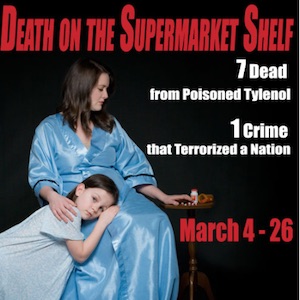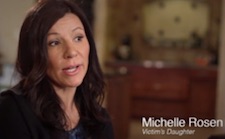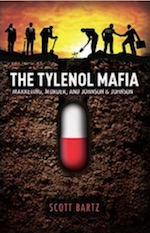 “Death on the Supermarket Shelf” is a play about the seven Tylenol murders in 1982 that will run from March 4 to March 26 at the Centerstage Theatre, Federal Way, between Seattle and Tacoma, Wash. Johnson & Johnson is criticized.
“Death on the Supermarket Shelf” is a play about the seven Tylenol murders in 1982 that will run from March 4 to March 26 at the Centerstage Theatre, Federal Way, between Seattle and Tacoma, Wash. Johnson & Johnson is criticized.
 It tells the story of Michelle Rosen, who watched her 27-year-old mother Lynn Reiner die of poisoned Tylenols just after she had returned home from giving birth to her brother Joshua. Lynn Reiner was one of seven victims of cyanide poisoning in the Chicago area.
It tells the story of Michelle Rosen, who watched her 27-year-old mother Lynn Reiner die of poisoned Tylenols just after she had returned home from giving birth to her brother Joshua. Lynn Reiner was one of seven victims of cyanide poisoning in the Chicago area.
“What followed was a nationwide panic that forever altered consumer confidence,” says an ad for the play.
We hope it will dramatize this story of sheer corporate meanness and culpability and spark a re-examination of it by major media which have so far dropped the ball on it, succumbing to J&J's endless praise of itself and its “code.”
No drug should ever have been sold in easily-doctored capsules and especially not after seven people died horrible deaths after ingesting spiked capsules.
Tablets dissolve just as fast in the stomach. J&J feared switching to them because competitors were not doing so.
It took another Tylenol poisoning death, that of 23-year-old Diane Elsroth of Peekskill, N.Y., on Feb. 17, 1986 to force J&J CEO James Burke to stop selling drugs in capsules. He said he was “sorry” the capsules had been returned to the market. They came back in “tamper-resistant” packaging. Who would buy a “bullet-resistant vest?”
Seven Dead; J&J Offers $100K Reward
Seven people were dead and J&J, a blue-chip with mega-bucks by ordinary standards, offered $100,000 for information leading to the arrest of the perpetrator. It should have been $10 million or $20 million.
Aiding and abetting the perpetrator was J&J itself. The Tylenol Mafia, by former seven-year employee Scott Bartz, details in nearly 500 pages the circuitous, sometimes five-stage route Tylenol ingredients took on their way to store shelves. There were many opportunities for an insider to slip cyanide into bottles that were being filled.
 J&J fought the families for eight years in court before making a settlement on May 23, 1991, a day before a trial was to begin. The families accepted a meager award, we are told, rather than face another eight years of legal wrangling.
J&J fought the families for eight years in court before making a settlement on May 23, 1991, a day before a trial was to begin. The families accepted a meager award, we are told, rather than face another eight years of legal wrangling.
Goats, in this modern morality play, include the police, who spent much effort trying to pin the murders on relatives; the media, which swallowed whole the J&J version of the murders; the Food & Drug Administration, which declared J&J blameless on the second day after the incident, and PR Society of America, which created a special “Silver Anvil” after J&J lost in 1983 to a program for Hygrade Hot Dogs.
The Bartz book charges a vast conspiracy by J&J employees and suppliers, the FDA, FBI, local and state police, public officials, media, the courts and PR firms. The object was to save J&J from being sued for hundreds of millions of dollars.
FDA chief Arthur Hull Hayes Jr. left the FDA in 1983 when he received a ten-year contract to work for Burson-Marsteller, J&J’s PR firm, at $1,000 a month. He later joined a company funded heavily by J&J. He became vice chairman and medical director of Nelson Communications, founded in 1987 by former J&J executive Wayne Nelson. The company got 39% of its $86 million in revenues from J&J in 1996. Nelson headed McNeil Consumer Products Co., created to market Tylenol in capsules.
13 Actors in Play
The play, written by Alan Bryce with music by Dawn Clement, has a cast of 13 including Dale Bowers as Burke, Sara Henley-Hicks as Michelle Reiner Rosen, Melanie Hampton as Lynn Reiner, Cooper Harris-Turner as Bartz, and Jamie Pederson as Ed Reiner, husband of Lynn.
Bryce, author of the play “For All That,” brings “a real life murder mystery with a darkly disturbing backdrop of corporate intrigue with the child of one of the victims (Rosen) still in relentless pursuit of the truth."
J&J was able to deflect suspicion and guilt from itself via a massive effort that strictly controlled communications on the tragic event. Much of the evidence in the form of bottles still on the shelves or in the homes of people, was either turned over to J&J or destroyed by consumers. It was an instance of a suspect in a crime receiving much of the evidence.
The company did not hold a press conference. It adopted the stance that it knew no more about the incident than anyone else.
Critics, however, including Bartz, contended there was plenty of proof that the Tylenols were poisoned while in the distribution chain of J&J and was not the work of a “mad person” running from store to store. Proof cited by Bartz is that Lynn Reiner obtained her poisoned Tylenols from a secure hospital pharmacy.
Media Swallowed J&J Info “Pills”
J&J was up to its ears in product recalls in 2010 resulting in a public apology by CEO Bill Weldon. Almost every story said the tarnish on J&J’s image was all the more newsworthy because of the stellar job it did in defending itself in 1982.
However, the stories neglected to mention the murder of Elsroth in 1986 via poisoned Tylenols. The murderer, it appeared, was still on the loose.
J&J brought Tylenol capsules back to the market within five weeks knowing the killer was still at large and despite many indications that the Tylenols were poisoned while in the J&J distribution chain.
Several PR professors have written that the five-day delay in pulling Tylenol capsules from the market should never be referred to as “immediate” or “instant,” and that there is no way of knowing how much the profit motive figured in J&J’s decision to re-market the capsules.
The profs, quoted in the online PR Journal of PRSA hosted by Prof. Don Wright, also focus on the rarely mentioned $100K reward that J&J offered in both the 1982 and 1986 murders. They write that this small sum was J&J’s way of claiming it had nothing to do with the murders.
Media Praise J&J/Tylenol
The Economist said April 10, 2010 that J&J/Tylenol was the “gold standard of crisis management.” The remark was in a column called “Schumpeter” written by Adrian Woolridge. Business editor Edward McBride said that “In the context of Toyota’s recent failings, or Tiger Woods’ infidelities, or any of the other episodes referred to in the article, J&J’s decision to recall Tylenol was very prompt—although the firm may well have made subsequent mistakes.
“It also seems unfair to say that such easily spiked capsules should never have been marketed,” he said. “To this day, supermarkets and drug stores across America and around the world remain full of products that could easily be tampered with.”
New York Times reporter Natasha Singer on May 3, 2010 praised J&J for its “fast and adept” handling of the Tylenol murders crisis.” An NYT headline March 22, 2002, said, “Tylenol made a hero of J&J: The recall that started them all.” Peter Goodman, in an Aug. 21, 2010 NYT feature that ran nearly three pages, called PR for Tylenol “Exhibit A in the lesson book on forthright crisis management.” NYT has never mentioned the Bartz Book although it is referenced by Wikipedia.
The Christian Science Monitor, said Jan. 15, 2010 that J&J’s response to the murders “is still regarded as a shining example of corporate social responsibility.”
The Motley Fool (fool.com), said J&J has been “the poster child for how to handle a crisis.”
Fortune magazine, on May 28, 2007 hailed J&J/Tylenol as the “gold standard in crisis control.” The writer was Jia Lynn Yant.
wikipedia.com says J&J’s “quick response” in 1982 “has become the gold standard for corporate crisis management.” It also has several lines devoted to the Bartz book.
The Tactics monthly of PR Society of America praised J&J in a full page in 2007 for providing “an enduring example of crisis management done right.” Mark McClennan, 2016 chair of the Society who is also with the MSL unit of Publicis, which is celebrating its 90th anniversary this year, should remove the Special Silver Anvil that J&J was awarded in 1983. J&J had spent millions with the Society in advertising and in funding its Kids in a Drug Free Society non-profit arm.
U of F Flunks Us
The University of Florida College of Journalism and Communications was contacted because a posting on its website called “Effective Crisis Management” says J&J “conducted an immediate product recall,” “knew they were not responsible for tampering of the product,” and put “public safety first.”
We asked College Dean John Wright, Ph.D., to correct these false or at least debatable statements.
David Carlson, executive director, Center for Media Innovation and Research at the College, said we offered “nothing but opinion.” He said the piece was by a student who quoted the Chicago Sun-Times, J&J, and Mark Mitchell of the Economic Assn. Int’l. The piece will be changed when those organizations change their opinions, he said.


 There’s a fine line between newsjacking and taking advantage, aka ambulance chasing. Our job as PR professionals is to tread it carefully.
There’s a fine line between newsjacking and taking advantage, aka ambulance chasing. Our job as PR professionals is to tread it carefully. PR firms need to be mindful of ways their work product may be protected by the attorney-client privilege whenever working with a client’s internal legal team or its external legal counsel.
PR firms need to be mindful of ways their work product may be protected by the attorney-client privilege whenever working with a client’s internal legal team or its external legal counsel. Manuel Rocha, former US ambassador and intenational business advisor to LLYC, plans to plead guilty to charges that he was a secret agent for Cuba.
Manuel Rocha, former US ambassador and intenational business advisor to LLYC, plans to plead guilty to charges that he was a secret agent for Cuba. CEO mentoring is an often-overlooked aspect of why CEOs are able to make good decisions, and sometimes make bad ones—all of which intersects with the role and duties of a board.
CEO mentoring is an often-overlooked aspect of why CEOs are able to make good decisions, and sometimes make bad ones—all of which intersects with the role and duties of a board.  How organizations can anticipate, prepare and respond to crises in an increasingly complex world where a convergent landscape of global challenges, threats and risks seem to arrive at an unrelenting pace.
How organizations can anticipate, prepare and respond to crises in an increasingly complex world where a convergent landscape of global challenges, threats and risks seem to arrive at an unrelenting pace.


 Have a comment? Send it to
Have a comment? Send it to 
No comments have been submitted for this story yet.